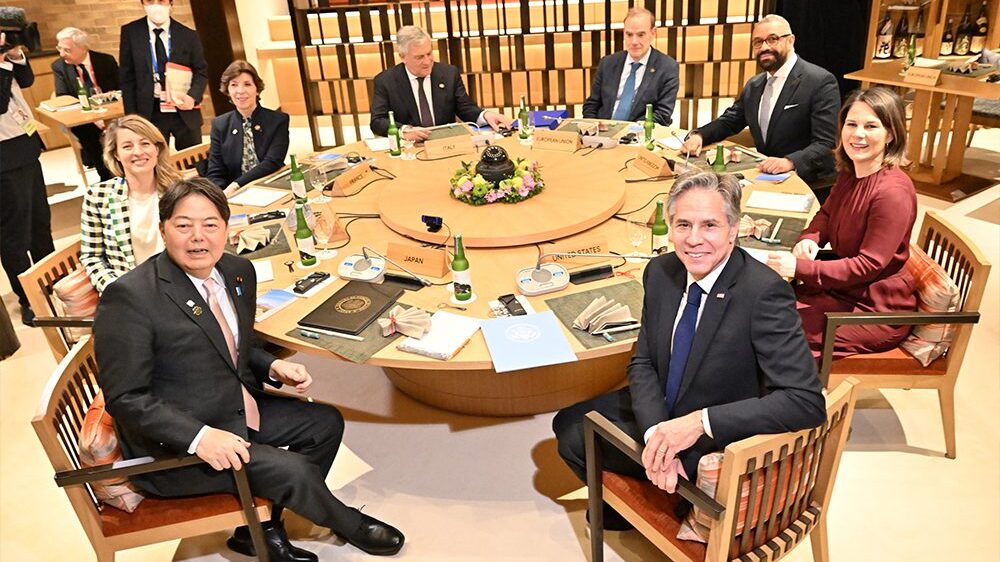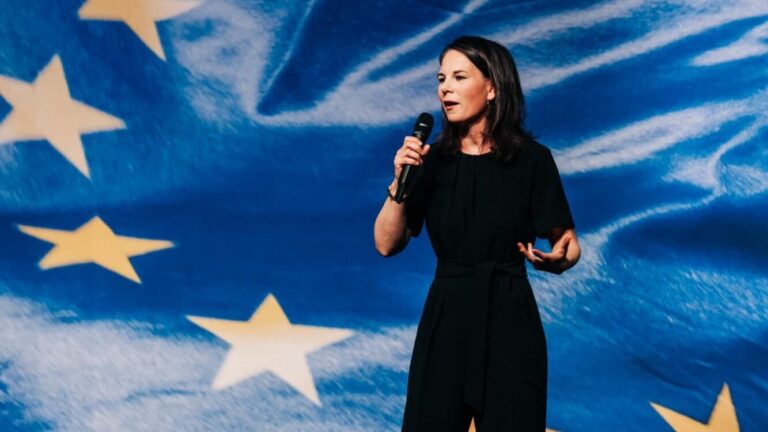At the close of a meeting in the Japanese resort town of Karuizawa, top diplomats from the Group of Seven (G7) signaled their disapproval of China’s increasing boldness concerning its claim on self-governed Taiwan. Russia and its war in Ukraine, however, continued to draw the lion’s share of the G7’s condemnation.
In a lengthy communique, which serves as a template for G7 leaders to follow when they make the trek to next month’s summit, the foreign ministers of Canada, France, Germany, Italy, Japan, the UK, and the U.S., plus the High Representative of the European Union stated their commitment “to uphold and reinforce the free and open international order based on the rule of law”—the largely U.S.-dominated system which came into view after WWII, and until recently, had remained virtually unchallenged.
Speaking to the press, Japanese Foreign Minister Yoshimasa Hayashi said that such a stated commitment by the G7 was a first, as well as its “strong objection to unilateral attempts to change the status-quo anywhere in the world,” a desired aim of China and Russia, who work towards the creation of a multipolar world order.
Among other “grave threats” to the “international system,” the consortium listed Iran, Myanmar, and Afghanistan, as well as North Korea, the latter made more acute by Pyongyang’s stepping up of its forays into WMD (weapons of mass destruction) and intercontinental ballistic missile programs.
For now, however, Russia is a more pressing matter for the G7. To continue to exert pressure on it, the G7 nations said they “remain committed to intensifying sanctions against Russia, coordinating and fully enforcing them,” and would support Ukraine “for as long as it takes.”
There could be “no impunity for war crimes and other atrocities such as Russia’s attacks against civilians and critical civilian infrastructure,” it added, accusations that the Kremlin strenuously denies.
As Russian military forces are making incremental gains on the battlefield, while digging in for an anticipated Ukrainian Spring counteroffensive (the success of which the U.S. harbors doubts about, according to recent Pentagon leaks), the foreign ministers were more concerned about Russia’s possible use of tactical nuclear weapons.
“Russia’s irresponsible nuclear rhetoric and its threat to deploy nuclear weapons in Belarus are unacceptable,” the ministers said, referring to the recent agreement between Russia and Belarus to have Russian nuclear weapons stationed on Belarusian soil.
China, a major trade partner for all G7 countries, proves a tougher nut to crack. As shown by a string of recent state visits made by European leaders to Beijing, Chinese President Xi Jinping’s position on Sino-Russian relations remained unshakable, as he refused to join the collective West in its condemnation of Russia’s war in Ukraine.
Even worse for EU unity, the reverse happened, with French president Macron’s post-Beijing visit statements on Taiwan and the EU’s relationship with the U.S. causing alarm within the bloc, prompting a strong reaction from Berlin.
Despite this apparent lack of unity, G7 members and U.S. officials were sure to emphasize their shared worry over China’s actions, as well as a desire to continue a coordinated approach to working with Beijing even as nations confront Chinese coercion and unfair economic practices.
Beyond this, Beijing’s muscular position on its claim to Taiwan and the South China Sea is causing considerable anxiety among G7 nations.
On that issue, the ministers said that peace and stability between China and Taiwan in the Taiwan Strait was “an indispensable element in security and prosperity in the international community,” as they called for “the peaceful resolution of cross-Strait issues.”
To that end, the communique urged China to
abstain from threats, coercion, intimidation or the use of force. We remain seriously concerned about the situation in the East and South China Seas. … There is no legal basis for China’s expansive maritime claims in the South China Sea, and we oppose China’s militarization activities in the region.
During his regular press conference, Chinese Foreign Minister Wang Wenbin hit back at the G7, saying it had “grossly interfered in China’s internal affairs and maliciously smeared and discredited China.” In his view, the communique reflected the group’s “arrogance, prejudice and deliberate desire to block and contain China. We deplore and reject this and have made a strong démarche to the host [of this year’s G7] Japan.”
Taiwan, he added, was “part of China’s sacred territory.” Moreover, he added, the one-China principle was “what underpins peace and stability across the Taiwan Strait.” Therefore, to ensure “real peace” in the Taiwan Strait, it was “absolutely essential” to “unequivocally oppose and stop any act for ‘Taiwan independence’.”





